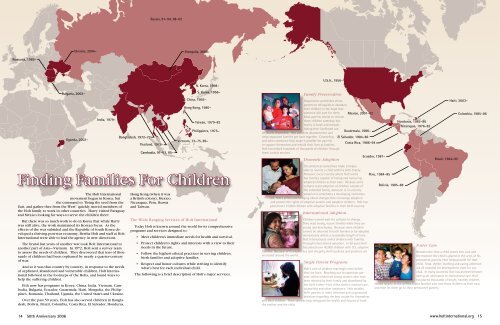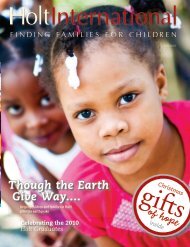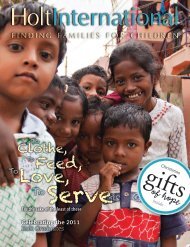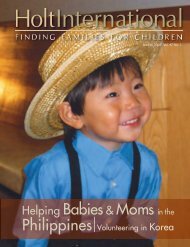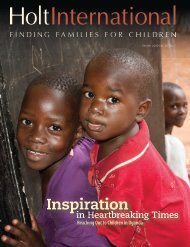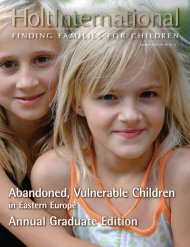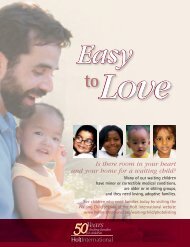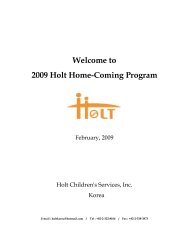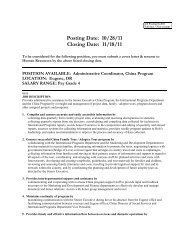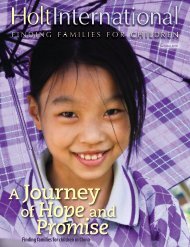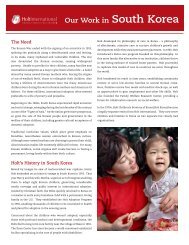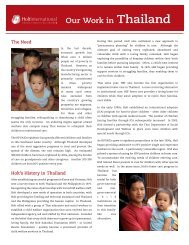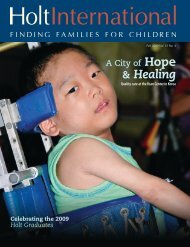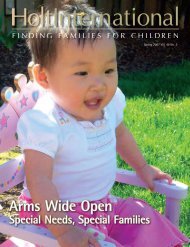My Name is Life - Holt International
My Name is Life - Holt International
My Name is Life - Holt International
Create successful ePaper yourself
Turn your PDF publications into a flip-book with our unique Google optimized e-Paper software.
Russia, 91–94, 98–02<br />
Ukraine, 2004–<br />
Mongolia, 2000–<br />
Romania, 1989–<br />
Bulgaria, 2002–<br />
Uganda, 2002–<br />
India, 1979–<br />
Bangladesh, 1972–73<br />
Thailand, 1976–<br />
Cambodia, 91–93, 05–<br />
N. Korea, 1998–<br />
China, 1993–<br />
S. Korea, 1956–<br />
Hong Kong, 1980–<br />
Taiwan, 1979–82<br />
Philippines, 1975–<br />
Vietnam, 73–75, 89–<br />
Finding Families For Children<br />
The <strong>Holt</strong> <strong>International</strong><br />
movement began in Korea, but<br />
the command to “Bring thy seed from the<br />
East, and gather thee from the West” quickly moved members of<br />
the <strong>Holt</strong> family to work in other countries. Harry v<strong>is</strong>ited Paraguay<br />
and Mexico looking for ways to serve the children there.<br />
But there was so much work to do in Korea that while Harry<br />
was still alive, the work maintained its Korean focus. As the<br />
effects of the war subsided and the Republic of South Korea developed<br />
a thriving post-war economy, Bertha <strong>Holt</strong> and staff at <strong>Holt</strong><br />
<strong>International</strong> were able to lead the agency in new directions.<br />
The brutal last years of another war took <strong>Holt</strong> <strong>International</strong> to<br />
another part of Asia—Vietnam. In 1972, <strong>Holt</strong> sent a survey team<br />
to assess the needs of children. They d<strong>is</strong>covered that tens of thousands<br />
of children had been orphaned by nearly a quarter-century<br />
of war.<br />
And so it was that country by country, in response to the needs<br />
of orphaned, abandoned and vulnerable children, <strong>Holt</strong> <strong>International</strong><br />
followed in the footsteps of the <strong>Holt</strong>s, and found ways to<br />
help the suffering children.<br />
<strong>Holt</strong> now has programs in Korea, China, India, Vietnam, Cambodia,<br />
Bulgaria, Ecuador, Guatemala, Haiti, Mongolia, the Philippines,<br />
Romania, Thailand, Uganda, the United States and Ukraine.<br />
Over the past 50 years, <strong>Holt</strong> has also served children in Bangladesh,<br />
Bolivia, Brazil, Colombia, Costa Rica, El Salvador, Honduras,<br />
Hong Kong (when it was<br />
a Brit<strong>is</strong>h colony), Mexico,<br />
Nicaragua, Peru, Russia<br />
and Taiwan.<br />
The Wide Ranging Services of <strong>Holt</strong> <strong>International</strong><br />
Today <strong>Holt</strong> <strong>is</strong> known around the world for its comprehensive<br />
programs and services designed to:<br />
• Meet children’s immediate needs for health and survival.<br />
• Protect children’s rights and interests with a view to their<br />
needs in the future.<br />
• Follow the highest ethical practices in serving children,<br />
birth families and adoptive families.<br />
• Respect and honor cultures while striving to identify<br />
what’s best for each individual child.<br />
The following <strong>is</strong> a brief description of <strong>Holt</strong>’s major services.<br />
U.S.A., 1956–<br />
Family Preservation<br />
Desperation sometimes drives<br />
parents to relinqu<strong>is</strong>h or abandon<br />
their children in the hope that<br />
someone will care for them. Mexico, 2001–02<br />
Most parents intend to reclaim<br />
these children someday, but<br />
reality <strong>is</strong> harsh and reestabl<strong>is</strong>hing<br />
their livelihood can<br />
Guatemala, 1986–<br />
be nearly impossible. <strong>Holt</strong> prevents abandonment and<br />
helps separated families get back together. Counseling El Salvador, 1984–86<br />
and other ass<strong>is</strong>tance help make it possible for parents<br />
Costa Rica, 1986–94<br />
to support themselves and rebuild their lives as families.<br />
<strong>Holt</strong> has helped hundreds of thousands of children through<br />
these various services.<br />
Ecuador, 1987–<br />
Domestic Adoption<br />
Circumstances sometimes make it impossible<br />
to reunite a child with h<strong>is</strong> birth family.<br />
However, every country where <strong>Holt</strong> works<br />
has families capable of loving and nurturing<br />
adopted children as their own. Because some<br />
cultures res<strong>is</strong>t adoption of children outside of<br />
the extended family, domestic or in-country<br />
adoption <strong>is</strong> sometimes a developing institution.<br />
Still, <strong>Holt</strong>’s efforts are bringing about changes that encourage adoption<br />
and protect the rights of adoptive parents and adoptive children. <strong>Holt</strong> has<br />
placed over 21,000 children with adoptive families in their birth country.<br />
<strong>International</strong> Adoption<br />
Children cannot wait for cultures to change.<br />
They need loving, secure families while they are<br />
young and developing. Because some children<br />
cannot be returned to birth families or be adopted<br />
domestically within a reasonable length of time,<br />
<strong>Holt</strong> <strong>International</strong> unites children with families<br />
through international adoption. In 50 years <strong>Holt</strong><br />
has placed over 40,000 children with U.S. adoptive<br />
families. Because of its experience and integrity, <strong>Holt</strong>’s policies and practices are<br />
emulated around the world.<br />
Single Parent Programs<br />
<strong>Holt</strong>’s care of children may begin even before<br />
they are born. Reaching out to expectant parents—often<br />
unmarried young women who have<br />
been rejected by their family and abandoned by<br />
the birth father—<strong>Holt</strong> offers shelter, medical care,<br />
counseling and other ass<strong>is</strong>tance. <strong>Holt</strong> enables<br />
birth parents to make informed and unpressured<br />
dec<strong>is</strong>ions regarding the best course for themselves<br />
and their children. These services help safeguard the health and futures of both<br />
the mother and the child.<br />
Peru, 1984–85<br />
Bolivia, 1985–88<br />
Honduras, 1983–86<br />
Nicaragua, 1976–82<br />
Foster Care<br />
Brazil, 1984–95<br />
Haiti, 2003–<br />
Colombia, 1985–86<br />
Between the time a child comes into care and<br />
the moment the child <strong>is</strong> placed in the arms of h<strong>is</strong><br />
permanent parents, <strong>Holt</strong> helps provide for that<br />
child. Food, shelter, clothing and caring attention<br />
are all essential for development, even for survival.<br />
In many countries <strong>Holt</strong> has pioneered foster<br />
care as an alternative to institutional care. <strong>Holt</strong><br />
has placed thousands of bright, healthy children,<br />
thanks largely to the selfless foster families who love these children as their own,<br />
and then let them go to their permanent parents.<br />
14 50th Anniversary 2006<br />
www.holtinternational.org 15


